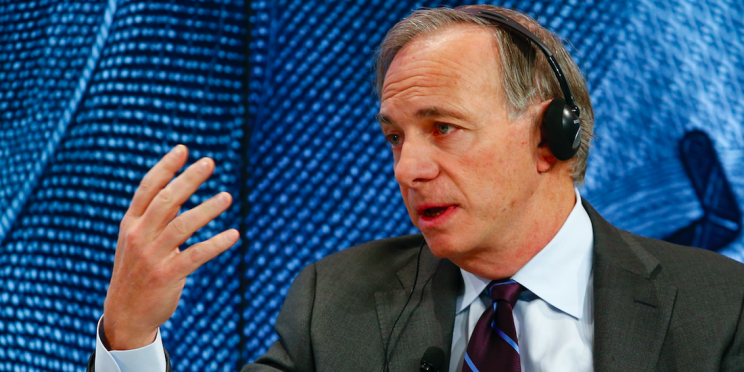RAY DALIO: There is a 'big squeeze' coming

Hedge fund billionaire Ray Dalio, the founder of $160 billion hedge-fund behemoth Bridgewater Associates, warned of a coming “big squeeze” in a speech delivered at the Federal Reserve Bank of New York’s 40th Annual Central Banking Seminar on Wednesday.
Dalio, 67, says that the long-term debt cycle, which typically lasts 50 to 75 years, is approaching its limits. This is also the “most important” force at play in the economy.
“The biggest issue is that there is only so much one can squeeze out of a debt cycle and most countries are approaching those limits,” Dalio said.
Since the financial crisis, central banks around the world loosened monetary policy aggressively, keeping interest rates low and encouraging more lending activity. But the incremental benefits of all of this has been diminishing. This is troubling when balance sheets are becoming increasingly debt-laden and vulnerable.
“In other words, they are simultaneously approaching both their debt limits and central banks’ ‘pushing on a string’ limits,” he said. “Central banks are approaching their ‘pushing on a string’ limits both because interest rates are approaching their maximum lows, and because the effectiveness of [quantitative easing] is approaching its limits as the risk premiums and spreads are compressing. Also, the wealth gap and numerous other factors make lending to spenders more challenging.”
Critically, this is not an isolated problem.
“This is a global problem,” he said. “Japan is closest to its limits, Europe is a step behind it, the US is a step or two behind Europe, and China is a few steps behind the United States.”
The coming squeeze will happen as the baby boomer generation leaves the workforce and begins collecting retirement and healthcare benefits like Social Security and Medicare. According to Dalio, many of these promises can’t be kept. The problem is the expected low returns on assets won’t be enough to fund those government liabilities.
For now, any sense of financial security among individuals can be characterized as a false sense of security.
“Holders of debt believe that they are holding an asset that they can sell for money to use to buy things, so they believe that they will have that spending power without having to work,” he said. “Similarly, retirees expect that they will get the retirement and health care benefits that they were promised without working. So, all of these people expect to get a huge amount of spending power without producing anything. At the same time, workers expect to get spending power that is equal in value to what they are giving. They all can’t be satisfied.”
It’s an all-around gloomy situation that could force policymakers into desperate positions before the whole thing ends in tears.
“As a result of this confluence of conditions, we are now seeing most central bankers pushing interest rates down to make them extremely unattractive for savers and we are seeing them monetizing debt and buying riskier assets to make debt and other liabilities less burdensome and to stimulate their economies,” he said. “Rarely do we investors get a market that we know is over-valued and that approaches such clearly defined limits as the bond market now.”
These low or negative interest rates translate to low or negative returns on bonds. This incentivizes investors and savers to avoid bonds and put their money into 1) safe-haven stores of wealth like gold, or 2) riskier assets like stocks that promise higher returns. Dalio argues that these alternatives are not necessarily cheap relative to their risks, but they certainly look cheap relative to bonds.
“[H]olding non-financial storeholds of wealth like gold could become more attractive than holding long duration fiat currency flows with negative yields (which is what bonds are), especially if currency volatility picks up.”
—
Julia La Roche is a finance reporter at Yahoo Finance.
Read more:
Ray Dalio: It would be ‘wrong’ for the Fed to hike rates soon
Billionaire Paul Singer warns of the biggest bubble in the world

 Yahoo Finance
Yahoo Finance 